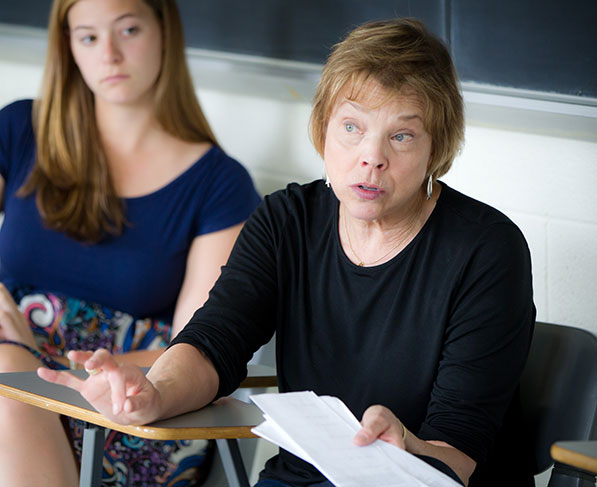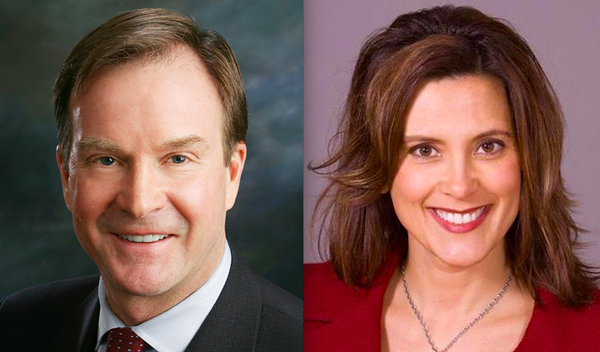Experts Matter. Find Yours.
Connect for media, speaking, professional opportunities & more.

The State of Georgia wants to replace its 16-year-old voting machines with paper ballots for fear of Russian election hacking, but are paper ballots safe? “Safe from hacking? Perhaps. Safe from voter error? Not so much,” said Scott Thorp, a user-centered design expert and chair of the Department of Art and Design at Augusta University. “User-centered design for paper ballots is crucial for free and fair elections. Good design should never influence how people vote. A design mistake might actually have cost Al Gore the presidency in 2000. Who is to say it couldn’t cost the governorship in Georgia this year?” Thorp, who also worked as a professor and design coordinator at the Savannah College of Art and Design, is available to discuss: • What user-centered design is • How design can influence people’s behavior • How bad design can lead to human error • Why designing paper ballots with users in mind is crucial for free and fair elections Thorp, who is also associate vice president for research at Augusta University, has worked for more than a decade as an exhibiting artist. His research interests include user-centered design, design thinking, and the psychology of creativity. Contact us to schedule an interview with Scott Thorp or learn more about his expertise. Source:

Backstage Racism is now Frontstage Racism
The disgusting and stereotypical diatribe illustrated by Carla Maloney, secretary of the Republican Committee of Beaver County, Pennsylvania is an example of blatant racism. There are no psychological or debating maneuvers one could use to arrive at any other conclusion. Comparing Black athletes to baboons and utilizing the old, "go back to Africa," make her perception of Blacks crystal clear. Picca and Feagin, in Two-Faced Racism: Whites in the Backstage and Frontstage, assert that, depending on company, Whites shift when discussing racists perceptions, ideology, jokes, and etc. Further, Whites in general feel more comfortable discussing their racist rhetoric when around other Whites. But in mixed company (racially), these tendencies almost never come to light. I argue that President's Trump's comfort to dive into historically founded racist waters has given courage to those who normally utilize backstage racism, to come forward and dive in as well. Backstage racism has now disappeared. Those normally displaying cowardly behavior are embolden to speak their unbridled true souls. Source:

Father-daughter expert: Steve Jobs’ daughter’s new book offers lessons on forgiveness
In her biting new memoir Small Fry, Lisa Brennan-Jobs, daughter of Apple co-founder Steve Jobs, paints a portrait of her father that is far from flattering. Brennan-Jobs’ forgiveness of her father’s flaws and reportedly cruel behavior leaves some perplexed – but not Linda Nielsen, a nationally renowned expert on father-daughter relationships. Nielsen says our reactions to Brennan-Jobs’ memoir may reflect more upon our own family relationships than those of the tech visionary and his oldest daughter. “Forgiving her father is a gift a daughter gives, not just to her father, but to herself. In choosing not to allow her bitterness about his failings as a father to consume her, a daughter is choosing not to deprive herself of whatever pleasure she can still derive from their relationship. She does not deny the past. But she does not dwell in it. Forgiving does not mean forgetting,” Nielsen wrote today for The New York Times. “Ms. Brennan-Jobs’ memoir may provide a comforting message for parents who fear that their mistakes and missteps inevitably will lead to irreparable damage — and for daughters who are grappling with their father’s failures as a parent. Adult children can choose to focus on the dearness or the darkness of their childhood relationships with their parents.” Nielsen is a professor of adolescent and educational psychology at Wake Forest University in Winston-Salem, N.C. She has researched and written about father-daughter relationships since 1970. For nearly 30 years, she has taught the only known college class in the U.S. devoted exclusively to the subject. Her latest book, Father-Daughter Relationships: Contemporary Research and Issues, examines what improves or weakens these relationships and their impact on society. Nielsen is available for interviews Wednesday and leading up to the Sept. 4 release of Small Fry. Source:

Is America’s economy about to learn a very hard lesson regarding student debt?
1.5 trillion dollars. That’s an enormous amount of money. And it’s the anchor around the next generation of Americans who have student debt. In fact, we’re now seeing people declaring bankruptcy before they’ve actually started accumulating wealth and participating in the economy. All of this spells bad news for the future. But what can be done? Is this a problem for politicians to solve? Is it up to schools to the schools charging thousands per year in tuition? Do lenders need to be regulated? Or should the onus fall on the student’s themselves who sign on the dotted line for loans they already know will be hard to pay back? There are a lot of questions out there and that’s where the experts from Cedarville University can help. Kim Jenerette is the Executive Director of Financial Aid at Cedarville University and is an expert in student debt, student load default rates and the overall affordability of education. Kim is available to speak with media regarding this growing issue. Simply click on his icon to arrange an interview. Source:

Bots artifically shape trends in online news
Researchers at George Mason University have found bots and Russian trolls spread misinformation about vaccines on Twitter during the U.S. election. But what exactly is a bot? Cybersecurity expert Tomas Hult, professor of criminal justice at Michigan State University, says people may assume that it means Twitter or Facebook is doing something. It's possible they even assume it is an actual robot sending messages. But, he says, the term bot means human actors are actually using automated tools to manipulate the online conversation and drive trends away from or toward an idea they value. Holt says this presents a massive threat to the safety of the online environment and the ways the public understands and value ideas. At the same time, bots artificially shape what trends and what seems important in our primary outlets for news online. Source:

Former U.S. Attorney Available to Discuss Fallout for Trump Administration in Light of Cohen Plea
Wheaton College Professor David Iglesias, a former U.S. Attorney in New Mexico whose areas of expertise include federal prosecutions, is available for interviews regarding the fallout for the Trump administration in light of Michael Cohen’s guilty plea in federal court on 8 criminal counts, including violation of campaign finance laws. “President Trump is now in a place few presidents have ever been,” Iglesias says. “At this point, he is basically an unindicted co-conspirator to federal crimes.” “I wouldn’t call it the beginning of the end, but it’s certainly the end of the beginning.” Iglesias is an associate professor of politics and law and director of the Wheaton Center for Faith, Politics, and Economics. He can discuss topics including: -The process of presidential pardons -How federal prosecutors treat indicted persons who cooperate with information concerning the crimes of other persons, and the quid pro quo for getting an individual to cooperate with law enforcement -Guilty pleas, hung juries, and sentencing in federal court -Impeachment (What Iglesias calls “the nuclear option for removing a sitting President of the United States”), the process, and why it has happened so rarely in U.S. history -Whether a sitting president can be indicted for crimes -The importance of the rule of law (Why is America the world leader for holding all accountable for their actions? What message is being sent if wealthy and powerful people can avoid criminal exposure for their actions?) -Watergate as a precedent, and similarities/differences with the current situation -Rules of federal investigations (How do federal agencies conduct investigations? What is public and what is non-public? Why are prosecutions that are considered "political" so dangerous for law enforcement?) To request an interview with Professor Iglesias, e-mail Wheaton College Director of Media Relations LaTonya Taylor at latonya.taylor@wheaton.edu. Source:

Will Snyder sink Schuette as polls point to a Whitmer win in November?
Michigan voters have a reputation for playing spoiler. And if early polling is any indication. it looks as if the typical back and forth between Democrat and Republican reign will happen again. Early polls show an overwhelming urge for change and all indicators point to former State Senate Minority Leader Gretchen Whitmer becoming the next Governor of Michigan. The state’s Attorney General and popular Republican candidate Bill Schuette seems to be hampered by the crisis in Flint coupled with the daily troubles Donald Trump bringing down the once strong GOP brand. But there is still time left. It was nearly two years ago that most thought the Democrats would carry Michigan for Clinton with relative ease. So, is there any chance the Republicans can hold the Governor’s mansion? What will Bill Schuette need to do to convince voters and reverse the usual trend that sees the state rotate between parties every two terms? Or, is this race over almost as quickly as it started? That’s where the experts from Michigan State University can help. Arnold Weinfeld is the acting director of the Institute for Public Policy and Social Research (IPPSR) at Michigan State University. He’s also an expert on local and state politics and was recently interviewed by Fox News and Bridge Magazine about the current race for governor. Arnold is available to speak to media – simply click on his icon to arrange an interview. Source:

As Trump’s tide goes out … Will Michigan ride the biggest of blue waves in November?
A little under two years ago, Michigan played a key role in Donald Trump’s surprising presidential victory. The state’s 16 crucial electoral college votes went to Trump as he won by a mere .3 percent over Hillary Clinton. Approximately 10,700 people put Trump over the top. To put that margin in perspective, the Detroit Red Wings average almost double that number of people showing up every game at home. That’s how slim the victory was. But have moods in Michigan changed? With races for the Governor’s mansion, Senate and House all taking place in November – will Michigan once again play the role of spoiler? However, previous special elections this year haven’t seen an overwhelming support for the DNC. In bell-weather Ohio, Democrats claimed a moral victory but still lost a crucial seat they hoped to gain in Congress. So, as the summer comes to an end and the gears of the election machinery shift into drive – what can we expect in Michigan? Will there be surprises? Should the RNC be written off or is too early to take Donald Trump and his team for granted? There’s a lot of speculation – but that’s where the experts from Michigan State University can help. Matt Grossmann is an Associate Professor of Political Science and the Director of the Institute for Public Policy and Social Research at Michigan State University. His expertise includes American politics, political parties and campaigns and he has been featured in the New York Times, Washington Post and other media outlets commenting on these issues. Matt is available for interviews – simply click on his icon to arrange an interview. Source:

It used to be a big deal – but has the once mighty blog gone bust?
In the days before Facebook … there were blogs. Blogs written by corporate leaders, academics, foodies, pundits and enthusiasts of every stripe. At one point, a blogger’s opinion could greenlight a film or sink a rising star. Blogs have massive influence. But those days are gone. Where blogs were once a salon for opinion and interest – the role that survived was usually as part of a larger institution’s communications strategy. It blended internal and external engagement – and it was effective. Until now, recently even Harvard acknowledged they were getting out of the blogging realm. But as blogs fade into the sunset – will the information, data and value be preserved? Should archives be created to maintain the history of these online conversations for future generations? Or, is it simply a delete and all that information is gone? Martha Burtis is the director of the digital knowledge center at the University of Mary Washington. An expert on this topic, she recently spoke with media regarding the winding down of blogs at Harvard. She is available to speak to media regarding this topic – simply click on her icon to arrange an interview. Source:

Do Cell Phones Cause Cancer? Ask a UMW expert
UMW Associate Professor of Biology Deb O’Dell was recently featured on “Do Cell Phones Cause Cancer?” which began airing Saturday, Aug. 18, on the With Good Reason public radio show. The program, broadcast in Fredericksburg on Radio IQ 88.3 Digital at 2 p.m. Sundays, explores O’Dell’s research on the possible carcinogenic effects of one of America’s favorite gadgets. Her results – she found that a single 25-minute exposure can significantly alter the activity of genes for up to 48 hours – “surprised and alarmed” her. “You don’t use your cell phone once every two days,” O’Dell told With Good Reason host Sarah McConnell, who said she was “amazed” by the research. “What I’m afraid of [is] that these changes are not being permitted to go back to their original state … but rather, by continually activating them, we’re causing them to change persistently and that could then lead to changes in how cells reproduce themselves leading then, maybe, to tumors.” Questions surrounding the safety of cell phones and the effects of the radiation they emit have long loomed large. O’Dell has spent years – and involved several UMW students – researching this phenomenon. If you are covering this topic and need to know more – Dr. Deborah O'Dell is available to speak with media. Simply click on her icon to arrange an interview. Source:







